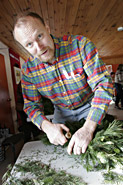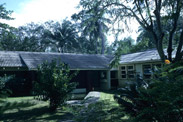In focus
Patrick Blue: Take a bough
Macdonald Campus security chief Patrick Blue has seen it all in the 20 years he's been at McGill. The rolling fields of the West Island campus are the scene for the kinds of security problems that could never be imagined downtown.

Patrick Blue at a wreath-making workshop
Owen Egan
Earlier this year, for instance, campus security was called out to track an intruder on campus — one that weighed roughly 1,000 pounds. It was a misguided male moose, and the massive mammal was apparently looking for love in all the wrong places.
"It swam across the river in mating season," explained Blue. "We had to track it and make sure it didn't wander onto the highways."
Sadly, the Alces alces didn't survive its adventure — Blue's team called in wildlife experts, who chased the animal until it ended up in a residential pool. As the creature would not be subdued, it had to be shot.
If wandering wildlife were Blue's only security concern at Macdonald, he'd have a quiet time indeed. However, with several kilometres of road and two major highways running through or near campus, one of his biggest concerns is traffic — especially speeding.
"We've had head-on collisions here," said Blue.
"Just a little while ago we had a roll-over — a guy went around a corner too fast and flipped. The car was a write-off."
John Abbott College pays for roughly half of the security operations at Macdonald, so Blue and his staff of 24 are responsible for the security needs of the CEGEP that shares land with the campus. Speeding is a big problem, so he has established a partnership with Montreal police to monitor the roads in and around campus.
Blue explained that his staff does not have the authority to give tickets, while Montreal police are not allowed to issue tickets on private land. Instead, when speeders are observed on campus, Macdonald security will pull offenders over and give them a "courtesy ticket." While many of the people they catch are John Abbott students, a number of faculty and staff have also been caught red-handed — or rather, lead-footed.
Blue also has a lofty, and somewhat quixotic, ambition: "I want to be the first man in Quebec to actually make people stop at crosswalks."
A history-making ambition, to be sure. It would add to many of the accomplishments that Blue already has at Macdonald. His security staff have a relatively low turnover rate compared to many other campus security operations, meaning that they have a high level of experience and familiarity with their beats. Due to Macdonald Campus's relative isolation, Mac's security cannot count on outside support when an emergency arises.
Blue is proud to note that his force is quite possibly the first college security team to own and be trained on a defibrillation machine. The level of preparedness for first-response emergency aid reflects the fact that Urgences Santé often takes 15 to 20 minutes to respond to emergency events on campus.
Although Blue clearly loves the work he does at Mac Campus, a part of his heart belongs to the woods of the Eastern Townships, where Blue owns a small organic tree farm.
"A lot of the trees you see in the lots, it's like they're on steroids, with all the pesticides and chemicals they put in them," said Blue. His own small operation is purely organic — a process that is more labour-intensive, but worth it, according to Blue.
For the last 15 or so years, he and his wife have also led workshops on how to make Christmas wreaths. Blue supplies the materials needed, including the boughs, which he hand-picks and cuts from the trees on his lot.
"I love getting out into the trees and trimming the branches. It's a fix. It's like doing a harvest of something I've planted — it's good for the soul," he said.
 |
||||
|
People think that Canada is just like the US with different weather. It's much harder to immigrate than one would think. |
||||
Bellairs Institute celebrates 50th
Fifty-three years ago, Vincent Massey, the then-chancellor of the University of Toronto, received a letter offering to donate a property in Barbados to a Canadian university.

Bellairs Institute in Barbados
Although Massey was an able Governor General and patron of the arts, he obviously missed the moment in school where they taught to never judge a book by its cover — or in this case, an offer by its letter.
"Poorly written on very cheap paper" (as Stanley Frost wrote in his history of McGill), the letter did not impress Massey, and so, rather than consider it for the U of T, he handed it off to then-principal of McGill, Cyril James.
As Frost wrote, "The writer of the letter proved to be Commander Carolyn Wilfroy Bellairs, R.N., whose eyesight had been failing for some time, and who wrote with some difficulty." His offer was very serious, and James travelled to Barbados to meet him.
As James recalled of that meeting, "He was convinced that scientific research would strengthen the economy of Barbados and enhance the welfare of its people. He would like McGill University to undertake the task of carrying out such research, and he would like to leave his estate to McGill as trustee for the discharge of that responsibility."
By 1954, McGill had sent biologist John Lewis to Bellairs's home (along with his wife), and he quickly set up a research station and program. A lab and aquarium were installed, and research begun on sea urchins — a mainstay of the Barbadian economy.
The Bellairs Institute is Canada's only teaching and research facility in the tropics. The shoreline property now has four buildings, with a laboratory and living facilities.
Alan Shaver, dean of Science, described Bellairs as one of McGill's "jewels in the crown."
"Since one of the priorities of the university has always been internationalism, the presence of a McGill research institute overseas is a natural extension of that concept, whereby we go out into the world as much as the world comes to us," he said.
Although the initial mission of the Bellairs Institute was marine biology, it quickly became used for all manner of research: agriculture, climatology, geomorphology and others.
More recently, Bellairs is a teaching facility as well as a get-away-from-it-all location.
"Field stations are tremendous opportunities to realize the two jointly related missions of McGill, which are teaching and research. We want to have our teaching research based, so the development of the field semester by the Faculties of Engineering and Environmental Sciences is a real embodiment of McGill's mission," said Shaver.
A reunion to mark the 50th anniversary of Bellairs was held on December 4, in Barbados. Present were several former directors of the institute, including John Lewis, who recalled the early days of the location, when the property was surrounded by sugar cane fields. He noted the effects of environmental degradation on the inshore reefs, which are a key part of the area's beauty.
 |
||||
|
Based on the differences that we observed between the different mammals, we were able to work out, with pretty good accuracy, what changes would have occurred during evolution and figure out what, most likely, was the ancestral sequence from which everyone started. |
||||
